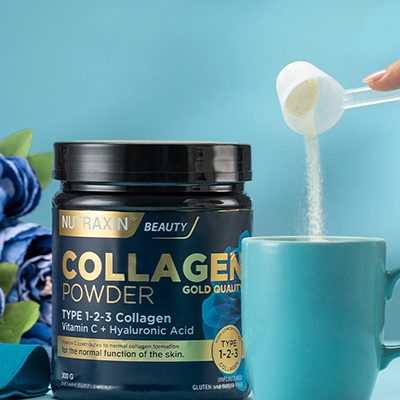Understanding Collagen: Benefits for Joint Health and Dietary Sources
Introduction: What is Collagen?
Collagen is a vital protein found throughout the body, particularly in connective tissues such as cartilage, tendons and ligaments. It is composed of amino acids and acts as a crucial structural component that maintains the integrity of our joints, skin, hair, and nails.
As the body’s most abundant protein, collagen plays a significant role in providing strength, elasticity and hydration to various tissues. However, collagen production naturally declines with age, necessitating dietary support or supplementation to maintain optimal health.
What are the benefits of collagen?
Collagen serves several critical functions in the body, making it an essential compound. Its versatility means that it can support with a number of health and wellbeing concerns. These include…
1. Joint health
Collagen is essential for maintaining the structure of cartilage, the tissue that cushions joints. It helps prevent the degeneration of cartilage and supports joint mobility, which in turn encourages good posture and mobility.
For those with joint health concerns, collagen supplementation can help to alleviate pain associated with various conditions, including osteoarthritis, by preserving the cartilage and reducing inflammation. It can be particularly helpful in relieving discomfort associated with exercise, helping you to stay fit and active without pain standing in your way.
2. Skin health
By maintaining skin hydration and elasticity, collagen reduces the appearance of wrinkles and promotes a youthful complexion. It can also help to tackle problems such as dryness or cracking, resulting in firmer skin.
Skin elasticity helps your skin to stretch and adapt to changes in your body shape and mass – for example, losing weight, building muscle mass or being pregnant.
3. Healing and recovery
Collagen aids in muscle recovery post-exercise by supporting muscle repair and reducing soreness, making it a popular choice for athletes and fitness enthusiasts looking to boost their physical activity. It does this by facilitating new cell growth, which aids in the repair of damaged tissue such as muscle tears.
4. Weight management support
Collagen may increase feelings of fullness and reduce appetite. Studies show that collagen consumption can lead to a significant reduction in food cravings, aiding in weight loss efforts.
It also supports muscle retention during weight loss – meaning you lose more fat and retain your muscle mass to become leaner and stronger.
Bone health
Collagen contributes to bone strength and structure, playing a crucial role in maintaining bone integrity. This helps to provide the support you need for physical activity, reducing your risk of breaks and fractures.
What foods contain collagen?
While supplements are a convenient way to increase collagen intake, many delicious foods naturally contain collagen or support its production:
Animal Sources:
- Bone Broth: This is rich in collagen and nutrients that are beneficial for joint health.
- Meat: Cuts of meat containing connective tissue, such as brisket and chuck, offer collagen.
- Fish: Salmon and tuna provide not only collagen but also omega-3 fatty acids, which are beneficial for heart health.
Plant Sources:
- Beans: Provide amino acids necessary for collagen synthesis and also contain antioxidants.
- Dark Leafy Greens: Spinach, kale, and Swiss chard are rich in chlorophyll, which helps increase collagen production in the skin.
- Fruits: Citrus fruits (oranges and lemons) and berries (strawberries, raspberries) contain vitamin C, which is essential for collagen synthesis.
Nuts and Seeds:
- Almonds and walnuts are rich in nutrients that help support collagen production.
How to Incorporate Collagen into Your Diet
To enjoy the benefits of collagen, consider the following strategies:
Dietary Sources:
- Incorporate bone broth into soups and stews or enjoy it on its own as a warm drink.
- Include more collagen-rich meats and seafood in your meals.
Supplements:
- Choose high-quality collagen supplements, with options available in powder, capsule or liquid forms.
Recipes:
- Experiment with smoothies that include collagen powder, incorporating fruits and greens to enhance nutrition.
The Importance of Collagen for Overall Health
Collagen is crucial for maintaining joint health, skin elasticity and overall bodily function. Given its wide-ranging benefits, incorporating collagen into your diet through food sources and supplements can significantly contribute to enhanced well-being.
While multivitamins can offer valuable support for overall health, it is essential to recognise that a balanced diet should remain the cornerstone of nutritional well-being. Multivitamins are intended to be a complementary measure and should not be considered a substitute for a diverse and nutritious food intake.
Note: It is strongly advised that individuals consult a healthcare professional prior to initiating any supplement, particularly if they have existing health conditions, are taking prescribed medications or are pregnant.




